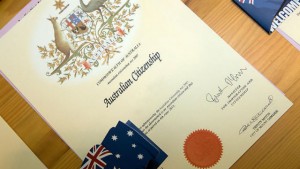Home » Commentary » Opinion » Section 44: ditching dual citizenship is hardly an onerous burden for parliamentarians
· The Sydney Morning Herald

 Labor’s David Feeney is the latest casualty of the politician’s ongoing war with the plain meaning of the constitution. It can be safely assumed he won’t be the last.
Labor’s David Feeney is the latest casualty of the politician’s ongoing war with the plain meaning of the constitution. It can be safely assumed he won’t be the last.
Much of the public debate on this issue seems to take for granted the idea that section 44, particularly subsection (i) – which prohibits dual citizens from sitting in Parliament – is outdated in today’s society. However, there are good public policy reasons for this restriction to exist, even if it’s inconvenient for some.
The first point to note is that constitutions are hard to change by design, and are expected to endure through shifting social and political circumstances. They must do so to maintain the public’s confidence for decades – or even longer.
As a result, their rules must be sufficiently certain and broad to cover as unlikely and disparate scenarios, such as a foreign spy being elected to Parliament or someone forgetting they hadn’t renounced foreign citizenship. Constitutions deal in absolutes. They cannot provide ambiguity to protect the absent-minded, if doing so provides an opening for the malevolent.
In Sykes v Cleary, a number of the justices noted the purpose of section 44(i) was, as Justice William Deane put it, “to prevent persons with foreign loyalties or obligations from being members of the Australian Parliament”. As noted further in Re Canavan, the multiple limbs in section 44(i) serve to disqualify someone either because their conduct or their status conflicts with the obligations of a member of Parliament.
This theme extends across the other subsections as well. Subsection (iv) prohibits someone who holds a position that may give rise to a conflict. Subsection (v) covers direct and indirect interests that may give rise to a conflict.
Importantly, subsections (iv) and (v) are qualified as to the offices and interests that do not give rise to such a conflict. This suggests that section 44 seeks to cover both situations where an actual conflict of interest can be identified, and situations where conflicts are likely to occur and where the appearance of such a conflict is therefore inevitable.
For democracy to function as intended, the public must believe that politicians are acting in the public’s best interests, not their own or someone else’s interests. The appearance of a conflict of interest, even if it doesn’t actually influence an individual’s behaviour, undermines that trust and confidence.
No one who follows modern political discourse, especially on social media, could believe this is less important now than it was in 1901.
If anything, there has been a proliferation of rules aimed at preventing the appearance of conflicts of interest in recent years, of which the ongoing debates over banning political donations are just one example. Proposals to reform section 44(i) typically aim to limit the application of the section to actual conflicts of interest and excise “status” conflicts like dual citizenship.
But remember, constitutions must deal with all potential circumstances. The point is not whether all dual citizens are conflicted but whether some dual citizens could be conflicted. At a minimum, for reform to be desirable, such a conflict needs to be sufficiently unlikely that no appearance of conflict of interest arises. Clearly, this is not the case.
Citizenship imposes by its very nature both rights and obligations on citizens. Some countries’ citizenship might not impose obligations that conflict with the duties of an Australian parliamentary member. But some do.
Also, some dual citizens might not feel allegiance to both countries but, again, some do. This allegiance can be intrinsic, bound up in who someone does, and doesn’t require a formal acknowledgement of duty – which would be caught by the first limb of section 44(i).
Consequently, it’s easy to see circumstances where people with a real conflict of interest, who are currently ineligible to sit in Parliament, would be let in if section 44(i) was changed. The only alternative argument to amend section 44 is that some other public policy reason must outweigh the importance of preventing these conflicts of interest.
While much is made of the fact that Australia has many migrants and so many potential dual citizens, this isn’t determinative, because section 44 does not forever prohibit the political participation of dual citizens. If it did, as article 2 of the US constitution prohibits those born outside the US from becoming president, a case may be made for change.
Dual citizens are entitled to stand for Parliament, be elected and hold the office of prime minister. The only requirement is that they shed the potential conflict of interest arising from their dual citizen status before doing so.
Such an obligation is not an onerous burden. Having such a provision in the constitution sends the message that politicians should have unequivocal loyalty to Australia and its people. That is hardly an outdated idea.
Simon Cowan is research manager at The Centre for Independent Studies.
Section 44: ditching dual citizenship is hardly an onerous burden for parliamentarians